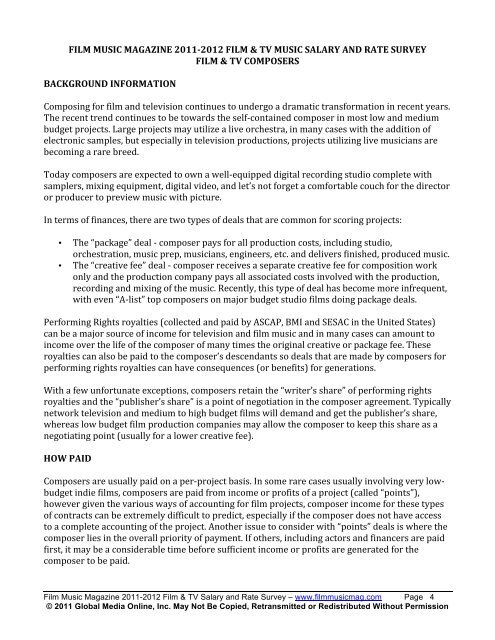Salary Survey 2011-2012 Final - Film Music Network
Salary Survey 2011-2012 Final - Film Music Network
Salary Survey 2011-2012 Final - Film Music Network
Create successful ePaper yourself
Turn your PDF publications into a flip-book with our unique Google optimized e-Paper software.
FILM MUSIC MAGAZINE <strong>2011</strong>-‐<strong>2012</strong> FILM & TV MUSIC SALARY AND RATE SURVEY<br />
FILM & TV COMPOSERS<br />
BACKGROUND INFORMATION<br />
Composing for film and television continues to undergo a dramatic transformation in recent years.<br />
The recent trend continues to be towards the self-‐contained composer in most low and medium<br />
budget projects. Large projects may utilize a live orchestra, in many cases with the addition of<br />
electronic samples, but especially in television productions, projects utilizing live musicians are<br />
becoming a rare breed.<br />
Today composers are expected to own a well-‐equipped digital recording studio complete with<br />
samplers, mixing equipment, digital video, and let’s not forget a comfortable couch for the director<br />
or producer to preview music with picture.<br />
In terms of finances, there are two types of deals that are common for scoring projects:<br />
• The “package” deal -‐ composer pays for all production costs, including studio,<br />
orchestration, music prep, musicians, engineers, etc. and delivers finished, produced music.<br />
• The “creative fee” deal -‐ composer receives a separate creative fee for composition work<br />
only and the production company pays all associated costs involved with the production,<br />
recording and mixing of the music. Recently, this type of deal has become more infrequent,<br />
with even “A-‐list” top composers on major budget studio films doing package deals.<br />
Performing Rights royalties (collected and paid by ASCAP, BMI and SESAC in the United States)<br />
can be a major source of income for television and film music and in many cases can amount to<br />
income over the life of the composer of many times the original creative or package fee. These<br />
royalties can also be paid to the composer’s descendants so deals that are made by composers for<br />
performing rights royalties can have consequences (or benefits) for generations.<br />
With a few unfortunate exceptions, composers retain the “writer’s share” of performing rights<br />
royalties and the “publisher’s share” is a point of negotiation in the composer agreement. Typically<br />
network television and medium to high budget films will demand and get the publisher’s share,<br />
whereas low budget film production companies may allow the composer to keep this share as a<br />
negotiating point (usually for a lower creative fee).<br />
HOW PAID<br />
Composers are usually paid on a per-‐project basis. In some rare cases usually involving very low-‐<br />
budget indie films, composers are paid from income or profits of a project (called “points”),<br />
however given the various ways of accounting for film projects, composer income for these types<br />
of contracts can be extremely difficult to predict, especially if the composer does not have access<br />
to a complete accounting of the project. Another issue to consider with “points” deals is where the<br />
composer lies in the overall priority of payment. If others, including actors and financers are paid<br />
first, it may be a considerable time before sufficient income or profits are generated for the<br />
composer to be paid.<br />
<strong>Film</strong> <strong>Music</strong> Magazine <strong>2011</strong>-<strong>2012</strong> <strong>Film</strong> & TV <strong>Salary</strong> and Rate <strong>Survey</strong> – www.filmmusicmag.com Page 4<br />
© <strong>2011</strong> Global Media Online, Inc. May Not Be Copied, Retransmitted or Redistributed Without Permission


